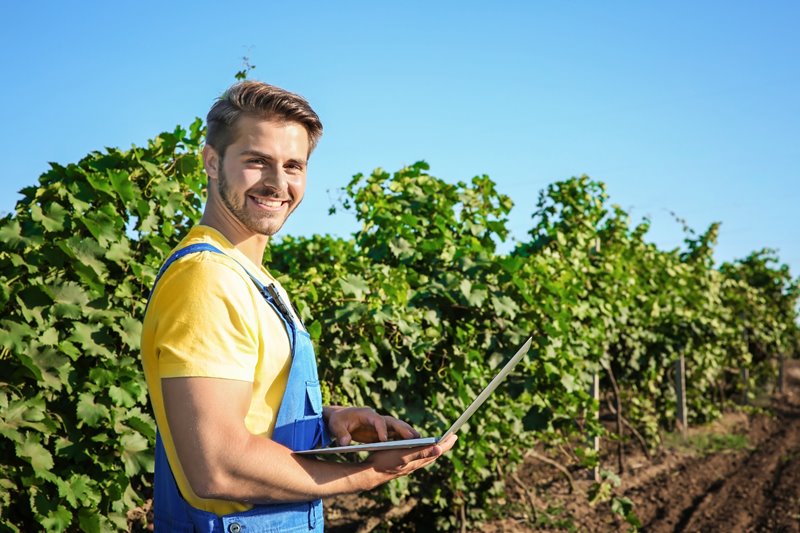A new era for french wine: tradition meets technology
How emerging technologies are transforming the french wine industry
2023-08-31

The technological revolution has transformed numerous industries, and the wine industry is no exception. French viticulture has been significantly impacted by technological innovation, optimizing practices from vineyard work to management, distribution, and communication. This revolution has brought numerous advantages but also poses challenges and important questions about the future of the industry.
Essential Tools in the Vineyard
Currently, the use of emerging technologies, such as robots, smart sensors, and drones, is becoming more common in vineyard work. These tools help in monitoring vine growth, preventing diseases, and treating the soil. For instance, robots like Ted Naio (manufactured in the USA) are used for specific tasks in the vineyards, such as vine pruning, grape harvesting, and soil tillage. These robots are precise and efficient, reducing the need for intensive labor.
Additionally, connected sensors on the vines measure parameters such as soil moisture, air temperature and humidity, wind, and light. These data allow viticulturists to optimize irrigation, phytosanitary treatments, and plot management. Moreover, drones enable vineyard monitoring from aerial perspectives, facilitating the detection of problematic areas, evaluation of vine growth, and control of irrigation and disease signs.
Precision viticulture, which involves using data and analysis to optimize viticultural practices, aims to improve crop quality and quantity while reducing resource usage like water, phytosanitary products, and energy. This results in improved productivity, sustainability, and grape quality, and by extension, the quality of the wines produced.
Smart Winemaking: The Marriage of Technology and Tradition
Winemaking has been a subtle blend of tradition, know-how, and creativity for millennia. However, in the era of technological advances, a new trend emerges: intelligent winemaking. This innovative approach combines traditional winemaker expertise with cutting-edge technologies to create wines of exceptional quality while pushing the boundaries of creativity.
Intelligent winemaking relies on a set of technologies that optimize each step of the wine production process, from grape pressing to bottling. This ensures quality raw materials and the development of a range tailored to all markets from the start of the process. In some wineries, winemakers perform periodic checks using new technologies: vats and barrels equipped with sensors control fermentation, temperature, humidity, and other key parameters remotely and in real time. This allows winemakers to respond quickly to changes and adjust conditions to achieve the desired flavor profile.
New technologies also allow better energy management and a reduction in the carbon footprint. For instance, cooling, heating, and lighting systems in wineries and wine production facilities can be monitored and controlled to reduce consumption. Additionally, renewable energy sources, such as photovoltaic panels, can power these facilities.
Tools for Administrative and Commercial Management
Technologies are also essential for the administrative, commercial, and marketing management of agricultural operations. Numerous adapted software applications, dedicated websites, e-commerce platforms, and social networks facilitate accounting, management, and stock tracking, among others. For example, tools like Bewease, Vinosoft, and PrimusSoft allow grouping in one tool the stock of bottles, accounting monitoring, and even commercial management. Besides wineries, many associations and regulatory councils are adopting these types of applications.
Challenges of Technology in Viticulture
Despite its numerous benefits, the use of monitoring technologies in vineyards raises concerns about the privacy of workers and visitors. It is crucial to find a balance between data collection to improve operations and respecting privacy. Additionally, excessive dependence on technology can create vulnerability in case of breakdown or malfunction. It is also necessary to master the technologies, as a misinterpretation of the results could distort an entire winemaking process. This will generate additional costs and disparities between 3.0 operations and others.
Moreover, questions arise about the impact on traditional skills. The introduction of robots and automation in viticulture could significantly reduce human presence, raising doubts about the preservation of artisanal skills and traditional knowledge of viticulturists. However, it could help address labor shortages, a serious issue for French vineyards.
Therefore, it is important for viticulturists to consider these challenges and find a balance between adopting new technologies and respecting traditional values and the environment. All in the interest of consumers, who often expect a product to tell a real human story.
Intelligent viticulture and winemaking do not aim to replace the roles of viticulturists and winemakers but to support them in their quest for excellence and innovation. By combining the ancient art of cultivation and winemaking with technological intelligence, new perspectives open up for the wine industry. The wines resulting from intelligent winemaking are not just products of the land but also the encounter between human ingenuity and the possibilities offered by modern technology.
Founded in 2007, Vinetur® is a registered trademark of VGSC S.L. with a long history in the wine industry.
VGSC, S.L. with VAT number B70255591 is a spanish company legally registered in the Commercial Register of the city of Santiago de Compostela, with registration number: Bulletin 181, Reference 356049 in Volume 13, Page 107, Section 6, Sheet 45028, Entry 2.
Email: [email protected]
Headquarters and offices located in Vilagarcia de Arousa, Spain.